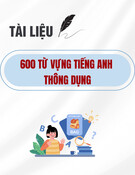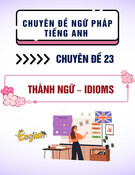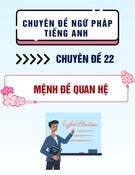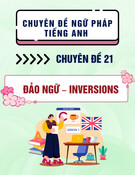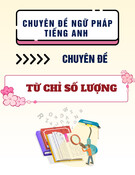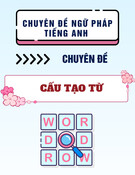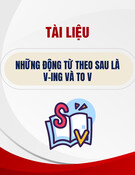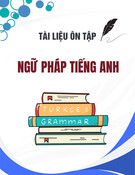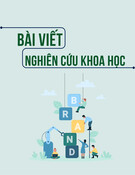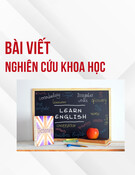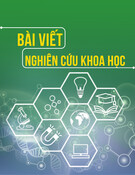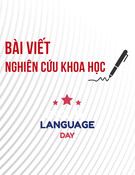
TNU Journal of Science and Technology
229(16): 205 - 211
http://jst.tnu.edu.vn 205 Email: jst@tnu.edu.vn
IMPROVING VOCABULARY PROFICIENCY THROUGH THE ANKI
APPLICATION IN TEACHING ENGLISH TO HIGH SCHOOL STUDENTS
Vu Dinh Bac*, Vu Kim Tuyen, Ninh Van Trung, Ma Cam Phong
TNU - University of Education
ARTICLE INFO
ABSTRACT
Received:
27/5/2024
This research aims to improve the vocabulary capacity of high school
students through the Anki application. Experimental activities are
conducted at the end of semester 1 and the beginning of semester 2 of
the 2023-2024 school year. A total of 8 lessons and 8-week lessons are
dedicated to achieving the desired results. The study involved 40
participants, of which 20 students were assigned to the experimental
group (using the Anki application) and the remaining 20 students
participated in the control group (not using the Anki application).
Although all 40 students participated in both the vocabulary pre-and
post-tests, only the experimental group's responses mentioned using the
Anki app and offered suggestions for optimal performance. Research
results show significant improvements in students' vocabulary,
including various aspects such as increasing vocabulary and
understanding how to use words in context. Different situations will
require different methods to enhance English speaking ability through
vocabulary usage. Additionally, the study offers several
recommendations to improve the effectiveness of Anki applications,
making them more popular, meaningful, and useful, while also
mitigating potential risks associated with their use.
Revised:
18/11/2024
Published:
18/11/2024
KEYWORDS
Anki application
Vocabulary acquisition
High school students
Educational technology
Mixed approach
PHÁT TRIỂN NĂNG LỰC TỪ VỰNG THÔNG QUA ỨNG DỤNG ANKI TRONG
DẠY HỌC TIẾNG ANH CHO HỌC SINH TRUNG HỌC PHỔ THÔNG
Vũ Đình Bắc*, Vũ Kim Tuyến, Ninh Văn Trung, Ma Cẩm Phong
Trường Đại học Sư phạm - ĐH Thái Nguyên
THÔNG TIN BÀI BÁO
TÓM TẮT
Ngày nhận bài:
27/5/2024
Nghiên cứu này nhằm mục đích nâng cao năng lực từ vựng của học sinh
phổ thông thông qua ứng dụng Anki. Hoạt động thực nghiệm được tiến
hành vào cuối học kỳ 1 và đầu học kỳ 2 năm học 2023-2024. Tổng cộng
có 8 buổi học và 8 buổi học kéo dài 8 tuần được dành riêng để đạt được
kết quả như mong muốn. Nghiên cứu có sự tham gia của 40 người tham
gia, trong đó 20 sinh viên được phân vào nhóm thực nghiệm (sử dụng ứng
dụng Anki) và 20 sinh viên còn lại tham gia vào nhóm đối chứng (không
sử dụng ứng dụng Anki). Mặc dù tất cả 40 học sinh đều tham gia cả bài
kiểm tra từ vựng trước và sau, nhưng chỉ có câu trả lời của nhóm thử
nghiệm đề cập đến việc sử dụng ứng dụng Anki và đưa ra gợi ý để đạt
hiệu suất tối ưu. Kết quả nghiên cứu cho thấy sự cải thiện đáng kể về vốn
từ vựng của học sinh, bao gồm nhiều khía cạnh khác nhau như tăng vốn từ
vựng và hiểu cách sử dụng từ trong ngữ cảnh. Những tình huống khác
nhau sẽ yêu cầu những phương pháp khác nhau để nâng cao khả năng nói
tiếng Anh thông qua việc sử dụng từ vựng. Ngoài ra, nghiên cứu còn đưa
ra một số khuyến nghị để cải thiện hiệu quả của các ứng dụng Anki, làm
cho chúng trở nên phổ biến, có ý nghĩa và hữu ích hơn, đồng thời giảm
thiểu rủi ro tiềm ẩn liên quan đến việc sử dụng chúng.
Ngày hoàn thiện:
18/11/2024
Ngày đăng:
18/11/2024
TỪ KHÓA
Ứng dụng Anki
Tiếp thu từ vựng
Học sinh phổ thông
Công nghệ giáo dục
Phương pháp tiếp cận hỗn hợp
DOI: https://doi.org/10.34238/tnu-jst.10471
* Corresponding author. Email: bacvd@tnue.edu.vn





